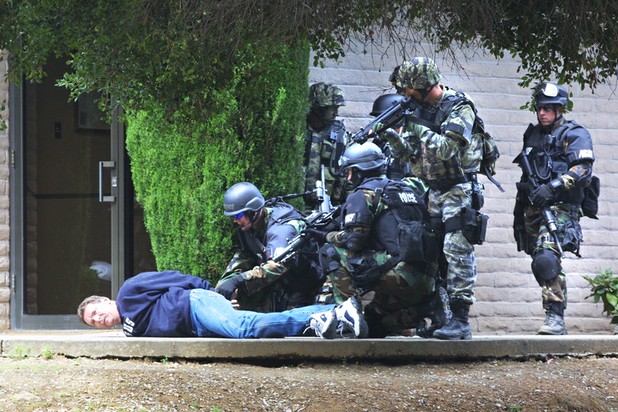Dallas Debates the “War On Drugs”
Last week, the Dallas Morning News printed a column by the local CEO of Mothers Against Teen Violence - Joy Strickland, arguing that the “war on drugs” puts our children at risk and that national drug laws have failed to minimize the availability of illicit drugs.
Instead, the criminalization of substances like marijuana has resulted in fantastic financial incentives to those selling drugs to America’s youth.
The so-called “war on drugs” had started during the Nixon years, to curb the supply and demand of selected substances that were deemed harmful and undesirable. Strickland argues that while billions are spent every year to arrest and prosecute drug suppliers and users, prevention strategies such as mentoring and conflict resolution receive poor support from federal policy makers.
Joy Strickland adds that addiction needs to be addressed as a medical problem requiring medical intervention – instead of treating it as a moral dilemma. “But if news reports are any indication, it is easy to believe that the rich and famous go to rehab while the poor go to jail. This disparity is the real moral issue. “
The Politics of Zero Tolerance is part of the problem. After all, if alcoholism were a crime pursued with zero-tolerance zeal then the turnout at Alcoholics Anonymous meetings would be rather low. So, getting rid of the severe penalties associated with illicit substance abuse would facilitate rehabilitation and save lives.
Then, yesterday, James Capra, the special agent in charge of the Dallas Field Division of the DEA rebuked Joy Strickland’s claims – here is his letter sent to the Dallas Morning News:
LEGALIZING POT IN NO WAY MAKES US SAFER
The column last week by the local CEO of Mothers Against Teen Violence once again highlights the misguided understanding and myths about marijuana legalization. Joy Strickland is on point when she writes, "every child deserves a safe and supportive home, school and community." But how does decriminalizing marijuana ensure that this will happen?
There is absolutely no evidence to suggest that legalization or decriminalization would reduce crime in our communities. However, ample evidence suggests that such action would result in more users and health costs.
Many advocates of decriminalization or legalization consistently point to The Netherlands and other European nations as an effective model for nirvana-like drug control. But these statements border on fantasy. Officials in The Netherlands blame the rise in crime in the past several years on their lax drug policy. Addicts are blamed for 80 percent of all property crime, and Amsterdam's burglary rate a few years ago was twice the rate of Newark, N.J.
The Dutch National Committee on Drug Prevention stated that marijuana use among students increased 250 percent in eight years. Most Dutch towns have adopted a zero-tolerance policy toward coffee shops that sell marijuana due to growing opposition to the idea that it is a relatively innocent soft drug. The Dutch have instituted new policies requiring 27 coffee shops in Rotterdam that sell marijuana within 200 meters of schools to close down by 2009.
The other myth intimated by Ms. Strickland is that the prisons are filled with drug users, in particular, marijuana users. This is an illusion that has been perpetuated by drug advocacy groups seeking to relax or abolish our marijuana laws.
The vast majority of inmates in state and federal prison for marijuana offenses have been found guilty of much more than simple possession. Some were convicted for drug trafficking and some for marijuana possession along with one or more other offenses. Also never mentioned is that many of those serving time for marijuana have plea-bargained down to possession in order to avoid prosecution on much more serious charges. Most criminals are repeat offenders with a lengthy history of other crimes.
For Ms. Strickland to suggest that she "is not aware of one single death directly caused by marijuana" or that it "is irrational to lock up an individual because of what he chooses to put into to his own body" as justification to decriminalize is disturbing logic. Ongoing scientific research continues to prove the harmful effects of marijuana on the body. More young people seek treatment for marijuana abuse than for any other substance.
In addition, many serious motor vehicle accidents and fatalities have occurred where the drivers have been charged with being under the influence of marijuana.The United States has had tremendous success in our fight against drug use and abuse:
According to the most recent survey, 860,000 fewer teenagers are using illicit drugs now than in 2001 a 24 percent decline.
Between 2001 and 2007, marijuana use by teens dropped by 25 percent. Methamphetamine use by teens plummeted 64 percent. The current use of Ecstasy has been slashed by 54 percent.
Overall, drug use among workers is at its lowest levels in 19 years. Since 1988, positive work place drug tests have fallen by 72 percent, from 13.6 percent in 1988 to 3.8 percent in 2007.
We would do well to continue our comprehensive drug enforcement strategy, to ensure that the next generation of Americans are free from the trappings of drug use and abuse and that they are afforded the blessings of liberty that are rightfully theirs. Legalizing or decriminalizing marijuana would hamper this progress and cause great harm to our schools and neighborhood communities.
(Copyright 2008 The Dallas Morning News, Inc.)


